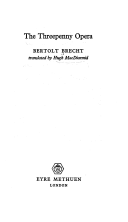
“What is the burgling of a bank to the founding of a bank?”
Macheath, in Act 3, scene 3, p. 92
The Threepenny Opera (1928)

The Threepenny Opera is a "play with music" by Bertolt Brecht, adapted from a translation by Elisabeth Hauptmann of John Gay's 18th-century English ballad opera, The Beggar's Opera, and four ballads by François Villon, with music by Kurt Weill. Although there is debate as to how much, if any, Hauptmann might have contributed to the text, Brecht is usually listed as sole author.The work offers a socialist critique of the capitalist world. It opened on 31 August 1928 at Berlin's Theater am Schiffbauerdamm.
“What is the burgling of a bank to the founding of a bank?”
Macheath, in Act 3, scene 3, p. 92
The Threepenny Opera (1928)
“For once you must try not to shirk the facts:
Mankind is kept alive by bestial acts.”
"What Keeps Mankind Alive?" Act 2, sc. 6
The Threepenny Opera (1928)
“For the task assigned them
Men aren't smart enough or sly
Any rogue can blind them
With a clever lie.”
Polly Peachum, in "The Song of the Futility of All Human Endeavor"; Act 3, scene 1, p. 75
The Threepenny Opera (1928)
“You may proclaim, good sirs, your fine philosophy
But till you feed us, right and wrong can wait!”
Macheath in "Second Threepenny-Finale"; Act 2, scene 3, p. 67
Variant translations:
However much you twist, whatever lies you tell
Food is the first thing, morals follow on.
Used by the Pet Shop Boys, in "What Keeps Mankind Alive?", Can You Forgive Her (1993 EP)
Food first, then morality.
The Threepenny Opera (1928)
"The Moritat of Mackie the Knife" in Prologue, p. 3
Translation note: A "moritat" (a word meaning both "muderous deed" and "ballad") is a street song telling of murderous crimes.
Lotte Lenya, "Foreword", p. xii
Variant translation: Oh the shark has pretty teeth dear,
And he shows them pearly white
Just a jack-knife has Macheath dear
And he keeps it out of sight.
Marc Blitzstein translation; largely used for Louis Armstrong's and Bobby Darin's pop renditions of "The Ballad of Mack the Knife"
The Threepenny Opera (1928)